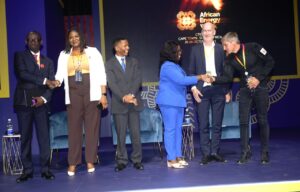A Deputy Chief Executive of the National Petroleum Authority, Mrs. Linda Boamah Asante, has called on African governments to initiate policies and programmes to make Liquefied Petroleum Gas (LPG) affordable and accessible to women.
This, she said, would help to reduce the hazards women are exposed to from using biomass (wood fuel and charcoal) to cook.
“All government agencies and institutions should have the plan to make sure that LPG is available to women because in Africa especially in rural areas, it is the women who do the cooking so they are the ones mostly affected by emissions from biomass,”Mrs. Linda Boamah Asante said while contributing to the discussion on the topic ‘LPG: An Integral Component of Energy Access for All’ at the just ended African Energy Week in Cape Town, South Africa.
The discussion, which was moderated by Dr Baah Nuakoh, General Manager for Strategy and Investment, Ghana National Petroleum Corporation (GNPC), also had Damilola Owalaboi, CEO of Selai Gas, Philippe Hoeblich, Co-founder PayGas, Mfano Nkutha, COO, Strategic Fuel Fund and Nicholas Mignot, Chief Financial Officer, Sahara Energy International.
Mrs. Linda Boamah told the gathering that LPG is safe, clear and reliable and urged African nations to put in place regulations to increase the consumption of LPG.
Sharing Ghana’s story on LPG, Mrs Asante told the gathering that Ghana had in place a National LPG Policy to achieve 50 percent penetration by 2030.

Touching on the specific steps being taken to achieve this goal, Mrs Asante said the Ministry of Energy, through NPA, has rolled out the Cylinder Recirculation Model to make LPG accessible to all, expecially women.
Under the CRM programme, Mrs Linda Boamah Asante explained that the value chain is such that there is an LPG bottling plant.
“There is an LPG bottling plant, where empty cylinders will be filled and transported to cylinder exchange points.
“Consumers would then go there and exchange their empty cylinders for filled cylinders based on the quantity of LPG they want to buy.
“There is also a retail shop that would have about 20 filled cylinders where consumers can go and exchange their empty cylinders for filled cylinders.
The programme was rolled out on September 1, 2023, in the Greater Accra and Ashanti Regions of Ghana.
The NPA is yet to determine when the remaining fourteen regions will roll out,” she explained.
Responding to a question on whether the NPA is educating consumers on the safe use of LPG, Mrs Asante mentioned that the NPA has been doing a lot of sensitisation across the country.
She said the Consumer Services Unit and Gas Department have been visiting schools, churches, mosques and markets to sensitise them on the safe use of LPG.
“We have been sensitising consumers. When we visit the schools and markets, we encourage women to use LPG because it’s reliable, clean, safe and more convenient. It has fewer health hazards as compared to woodfuel,” she said.
In her concluding remarks, Mrs Linda Boamah Asante stated that the Cylinder Recirculation model programme has come to stay, stressing that LPG is the way to go for Ghana.










